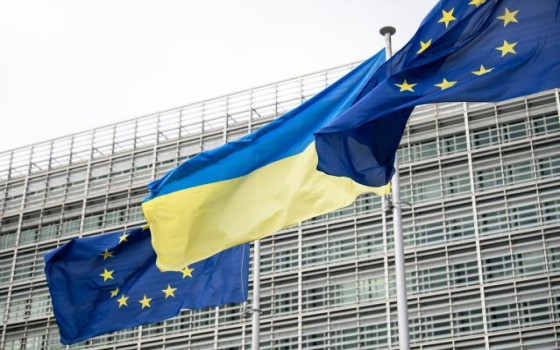
In response to the Russian military parade, European leaders arrive in Kyiv to express solidarity, call for a 30-day ceasefire, and move forward with the establishment of a special tribunal for war crimes in Ukraine

- Europe and Arabs
- Saturday , 10 May 2025 11:30 AM GMT
Brussels - Kyiv: Europe and the Arabs
French President Emmanuel Macron, newly appointed German Chancellor Friedrich Merz, British Prime Minister Keir Starmer, and Polish Prime Minister Donald Tusk arrived in Kyiv on Saturday morning. The four countries want to reaffirm their support for Ukraine and have also asked Moscow to accept a "full ceasefire" for 30 days.
The European leaders' arrival follows a military parade in Moscow on Friday, where President Vladimir Putin celebrated the 80th anniversary of the victory over Nazi Germany, attended by Chinese President Xi Jinping, among others. The Western delegation sees its visit as a symbolic gesture.
A joint statement from the four countries read: "We will continue to increase our support for Ukraine and increase pressure on the Russian war machine until Moscow agrees to a permanent ceasefire." According to media reports in Brussels on Saturday, including the Belgian newspaper Newsblad, which added, "Macron, Mertz, and Starmer traveled by train from Poland. Tusk arrived separately and posted a video of his arrival on social media. In Kyiv, they were received by Ukrainian Supreme Chancellor Andriy Yermak and Deputy Foreign Minister Andriy Szypega. Later today, they will join President Volodymyr Zelensky and Prime Minister Tusk at a virtual meeting of the "coalition of the willing"—some 30 countries willing to provide security guarantees to Ukraine after the peace agreement. According to the four, steps are being taken toward forming a future international coalition with air, land, and naval capabilities, led by France and the United Kingdom.
On Thursday, US President Donald Trump called on Moscow to agree to an "unconditional ceasefire" for 30 days and threatened to impose new sanctions if it refused.
According to a European statement issued in Brussels on Friday evening, "The European Union remains steadfast in its commitment to achieving a comprehensive, just, and lasting peace in Ukraine, based on the principles of the UN Charter and international law, and welcomes all Efforts to achieve this peace. The statement issued by the office of European High Representative for Foreign Affairs and Security Policy Kaja Kallas read: “We join Ukraine and international partners, including the United States, in calling for a complete and unconditional ceasefire for at least 30 days. This temporary pause in hostilities could be a vital step toward reducing civilian suffering and allowing meaningful talks to achieve a genuine peace aimed at ending Russia’s war of aggression and restoring a comprehensive, just, and lasting peace.
As in the past, Russia must now demonstrate its willingness to make peace.”
This statement was endorsed by other non-EU participants in the informal meeting of EU foreign ministers in Lviv on May 9: Moldova, North Macedonia, Norway, Ukraine, and the United Kingdom.
Yesterday, on Europe Day (May 9), as tanks rolled through Moscow’s Red Square in a show of force, with the participation of many foreign leaders allied with Russia, European foreign ministers gathered in Lviv, Ukraine, to deliver a different message—one, in their own words, of solidarity and justice. and a long-term military partnership with Ukraine, as many of the nearly 20 European foreign ministers emphasized during the Lviv meeting.
Ukrainian officials, including Foreign Minister Andriy Sipia, Prime Minister Denys Shmyhal, and senior EU diplomats, signed a landmark agreement to support Ukraine's defense industry and committed to advancing the establishment of a special tribunal for Russian war crimes in Ukraine.
This agreement represents a major step in international efforts to hold Moscow accountable for what is considered the most serious violation of international law committed against Ukraine.
"This is a concrete step to help Ukraine not only defend itself today, but also build long-term resilience," said EU foreign policy chief Kaja Kallas.
The agreement, backed by €1 billion in windfall profits from frozen Russian assets, is designed to facilitate the joint production and purchase of military equipment.
Since the start of Russia's full-scale invasion in 2022, Western countries have frozen nearly $300 billion in Russian sovereign assets. In October 2024, the G7 agreed to loans to Ukraine worth nearly $50 billion, to be repaid from the proceeds of these frozen assets.
During the visit, the ministers convened a session of the international coalition to push for the establishment of a special war crimes tribunal to prosecute Russia's top leadership for its full-scale invasion of Ukraine.
While the International Criminal Court has issued arrest warrants for several Russian officials for war crimes, it lacks jurisdiction to prosecute the crime of aggression against a non-signatory state like Russia—a legal loophole the new tribunal seeks to fill.
"It's a major achievement, as (Vladimir) Putin can now be tried," a diplomat told the Kyiv Independent.
President Volodymyr Zelensky has been pushing for the establishment of a special tribunal to hold Russian leaders, including President Vladimir Putin, accountable for launching the full-scale invasion.












No Comments Found